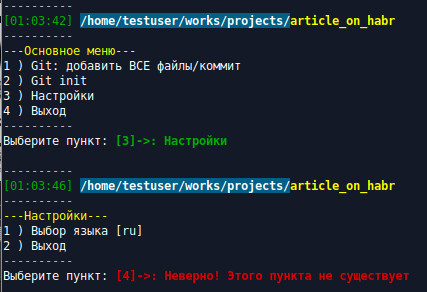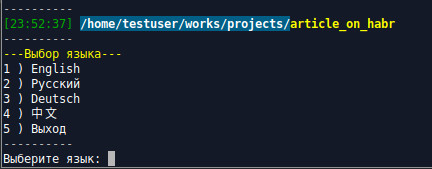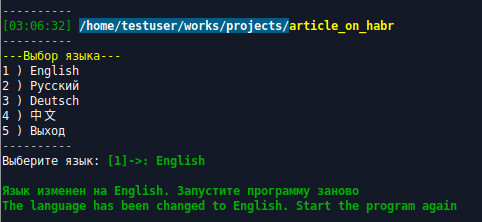This is a continuation of the article Localizing your scripts in BASH . In it, using arrays and indirect references, we learned to add additional languages to our scripts and switch between them.
In this article, we will compile a list of built-in languages and set the choice of language through the menu, building a multi-level menu for this. To prevent the article from turning into one big piece of code with a description of each line, I will post the code itself with detailed comments below, and here I will touch on only a few main points.
Menu creation
In the last article, we used a loop for
and a selection operator to display a menu on the screen and select the required item case
. Obviously, to create a multi-level menu, these steps will need to be repeated several times, that is, for each submenu. In this case, you will have to re-create the menu header, appearance, and so on.
A good way to avoid it - to make for
, case
and read
in a separate function (call it prints
), and then we will simply pass it to the required parameters. All scripts that will be executed when certain menu items are selected will also be transferred to the corresponding functions.
So, to add a new action to the script:
add words and phrases to the language array
into the array with the main or additional menu, insert the corresponding item and the command to call the function
add a function with the required code fragment
First, let's create a main menu, which will immediately appear on the screen when the script is launched:
menu0=("${lng[3]};main" "${lng[4]};gitadd" "${lng[5]};gitinit" "${lng[2]};options" "${lng[1]};exit")
: , ;
- , . , . , , .
main
:
main() {
#
local menu0=("${lng[3]};main" "${lng[4]};gitadd" "${lng[5]};gitinit" "${lng[2]};options" "${lng[1]};exit")
while true ; do
#
# ,
prints "menu0[@]" "${msg[1]}"
done
}
main
, options
:
options() {
local menu1=("${lng[2]};options" "${lng[7]} [$langset];langmenu" "${lng[1]};exit")
prints "menu1[@]" "${msg[1]}"
prints
, . , . cut
:
if [[ "$1" == "text" ]] ; then
#
echo "$2" | cut -d ";" -f 1
return
elif [[ "$1" == "command" ]] ; then
#
echo "$2" | cut -d ";" -f 2
return
fi
, , ${prints "text" "${menu[0]}"}
, - .
, : . colors
. ANSI escape ( echo -e
) 256 .
, , pwds
, . , .

, .
prints
. , :
local menu=("${!1}")
- . , , 1 :
pwds
colors "title" "---$(prints "text" "${menu[0]}")---"
for
,
, read
case
:
for (( op=1; op < "${#menu[@]}"; op++ )); do
colors "item" "$op ) $(prints "text" "${menu[$op]}")"
done
echo ----------
read -s -n1 -p "$(colors "item" "$2: ")" item
case $item in
[1-$((${#menu[@]}-1))] )
#
colors "ok" "[$item]->: $(prints "text" "${menu[$item]}")"
#
$(prints "command" "${menu[$item]}") ;;
# [q]
"q" ) echo; exit;;
#
* ) colors "err" "[$item]->: ${msg[2]}"; sleep 2 ;;
esac

. , .
, , , . langmenu
.
, . . , sed
language_
. language_ru
ru
:
# [-r] -
# [-n] - ,
local lng_sfx=($(sed -r -n "s/^\s?+language_(\w+)=.*/\1/p" "${0}"))
, , prints
. . langmenu
:
langmenu(){
local lng_sfx=($(sed -r -n "s/^\s?+language_(\w+)=.*/\1/p" "${0}"))
local menu2=("${lng[7]};langmenu")
for a in ${lng_sfx[@]} ; do
local d="language_$a[@]"; d=("${!d}")
menu2+=("$d;languages set $a")
done
menu2+=("${lng[1]};exit")
prints "menu2[@]" "${msg[6]}"
}
:
. ,
0
( ). : ,;
, ,languages
.
"English;languages set en"
,set en
-languages
.
prints
. ,

. sed
-i
-r
, -i
- () , -r
- .
: , langset=
langset=
:
sed -i -r "0,/^\s?+langset=/s/langset=[\"\']?\w*[\"\']?/langset=\"$langset\"/" "${0}"
exit
prints
. , , case
languages
, set
. languages
, . :
languages
if [ "$1" == "set" ] ; then
#
langset="$2"
local df="language_$langset"
echo
# ,
colors "ok" "${msg[7]} ${!df}. ${msg[8]}"
#
languages
# ,
colors "ok" "${msg[7]} ${lng[0]}. ${msg[8]}"
echo
# langset=
sed -i -r "0,/^\s?+langset=/s/langset=[\"\']?\w*[\"\']?/langset=\"$langset\"/" "${0}"
exit
fi

In this and the previous article, we created a template that you can use to write your own scripts with the ability to display on-screen menus and messages in different languages. In this case, the script consists of one file and to add a new language it is enough to drop the array with words at the beginning of the script, and to add any action - create a function and register it in the menu.
Thanks for reading to the end.
All the code with comments is attached below.
The whole code
#!/bin/bash
#
langset="ru"
#
language_en=( "English" "Quit" "Options" "Main menu" "Git: add ALL files/commit" "Git init" "Change language" "Language selection" )
message_en=( "English" "Select item" "Wrong! This item does not exist" "Added all files" "Enter you commit" "Changes recorded" "Select a language" "The language has been changed to" "Start the program again" "Repository not found\nPlease, select Git init pepository" )
language_ru=( "" "" "" " " "Git: /" "" "" " " )
message_ru=( "" " " "! " " " " " " " " " " " " " " \n, , Git init" )
language_de=( "Deutsch" )
message_de=( "Deutsch" "" "" "" "" "" "" "" "Starten Sie das Programm neu" )
language_cn=( "中文" "出口" "设置" "主菜单")
message_cn=( "中文" "选择项目" "" "" "" "" "选择语言" "语言已改为" "重新启动程序" )
# Settings section
languages() {
#
#
lng="language_$langset[@]"; lng=("${!lng}")
msg="message_$langset[@]"; msg=("${!msg}")
#
for b in ${!language_en[@]} ${!message_en[@]} ; do
if [[ ! ${lng[$b]} ]] ; then
lng[$b]=${language_en[$b]}
fi
if [[ ! ${msg[$b]} ]] ; then
msg[$b]=${message_en[$b]}
fi
done
#
if [ "$1" == "set" ] ; then
#
langset="$2"
local df="language_$langset"
# ,
# ,
echo
colors "ok" "${msg[7]} ${!df}. ${msg[8]}"
#
languages
#
# ,
colors "ok" "${msg[7]} ${lng[0]}. ${msg[8]}"
echo
#
# langset=
# [-r] -
# [-i] -
# [0,] -
sed -i -r "0,/^\s?+langset=/s/langset=[\"\']?\w*[\"\']?/langset=\"$langset\"/" "${0}"
exit
fi
}
#
languages
colors() {
# . ,
# ,
# [48] - , [38] -
# [5] - 8- (0-255), [1] - ,
# [22] - , [0] -
case "$1" in
# : - ()
"tm" ) echo -e "\e[48;5;256;38;5;34;22m$2\e[0m" ;;
# : -, : ( )
"pt" ) echo -e "\e[48;5;24;38;5;15;1m$2\e[0m" ;;
# : - ( )
"cf" ) echo -e "\e[48;5;256;38;5;226;1m$2\e[0m" ;;
# : - ( )
"ok" ) echo -e "\e[48;5;256;38;5;34;1m$2\e[0m" ;;
# : ( )
"err" ) echo -e "\e[48;5;256;38;5;160;1m$2\e[0m" ;;
# : - ( )
"title" ) echo -e "\e[48;5;256;38;5;226;22m$2\e[0m" ;;
# : ( )
"item" ) echo -e "\e[48;5;256;38;5;15;22m$2\e[0m" ;;
esac
}
pwds() {
#
echo
echo ----------
echo "$(colors 'tm' "[$(date +"%T")]") $(colors 'pt' "${PWD%/*}"/)$(colors 'cf' "$(basename "$PWD")")"
echo ----------
}
prints() {
#
# , [;]
if [[ "$1" == "text" ]] ; then
echo "$2" | cut -d ";" -f 1
return
elif [[ "$1" == "command" ]] ; then
echo "$2" | cut -d ";" -f 2
return
fi
# ,
local menu=("${!1}")
#
pwds
# ,
# 1
colors "title" "---$(prints "text" "${menu[0]}")---"
#
for (( op=1; op < "${#menu[@]}"; op++ )); do
# ,
#
colors "item" "$op ) $(prints "text" "${menu[$op]}")"
done
echo ----------
# ,
read -s -n1 -p "$(colors "item" "$2: ")" item
#
case $item in
# 1 1 ( 0)
#
#
[1-$((${#menu[@]}-1))] ) colors "ok" "[$item]->: $(prints "text" "${menu[$item]}")"
# ,
#
$(prints "command" "${menu[$item]}") ;;
# [q]
"q" ) echo; exit;;
#
* ) colors "err" "[$item]->: ${msg[2]}"; sleep 2 ;;
esac
}
# Application section
gitinit() {
# : [git init]
git init
}
gitadd() {
# : [git add] -
git add .
# . [0]
#
if [[ "$?" != "0" ]] ; then
colors "err" "${msg[9]}"
sleep 1
return 1
fi
echo "${msg[3]} ..."
#
read -p "$(colors "item" "${msg[4]}: ")" comm
git commit -m "$comm"
#
colors "ok" "${msg[5]}"
}
# Menu section
langmenu() {
#
# ,
# [language_*]
# [-r] -
# [-n] - ,
local lng_sfx=($(sed -r -n "s/^\s?+language_(\w+)=.*/\1/p" "${0}"))
#
local menu2=("${lng[7]};langmenu")
# , ,
# 0 ( )
for a in ${lng_sfx[@]} ; do
local d="language_$a[@]"; d=("${!d}")
#
# ,
# [;], ,
# [languages] .
# ["English;languages set en"], [set en] - [languages]
menu2+=("$d;languages set $a")
done
#
menu2+=("${lng[1]};exit")
#
# ,
prints "menu2[@]" "${msg[6]}"
}
options() {
#
# ,
# [;], ,
local menu1=("${lng[2]};options" "${lng[7]} [$langset];langmenu" "${lng[1]};exit")
#
# ,
prints "menu1[@]" "${msg[1]}"
}
main() {
#
# ,
# [;], ,
# , , -
# ,
local menu0=("${lng[3]};main" "${lng[4]};gitadd" "${lng[5]};gitinit" "${lng[2]};options" "${lng[1]};exit")
while true ; do
#
# ,
prints "menu0[@]" "${msg[1]}"
done
}
main
exit 0